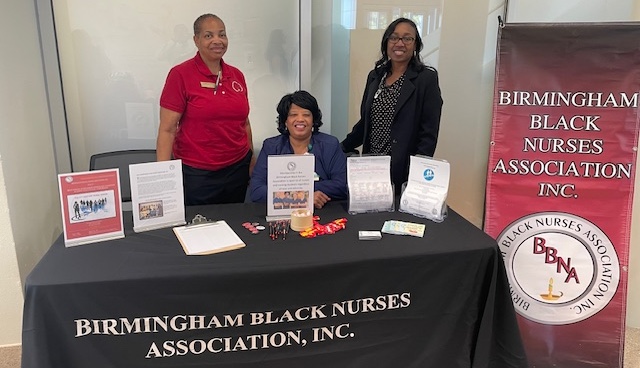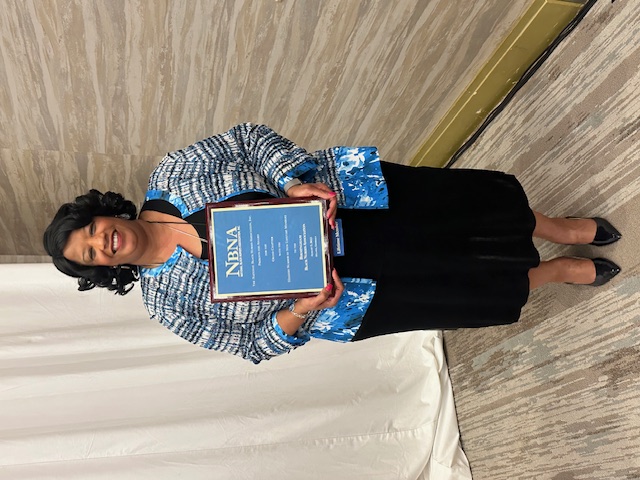
Her mother was a nurse. Her sister is a nurse. So naturally Patricia Curry, CNMT, RN (NMT,1992) became – a certified nuclear medicine technologist. She received a BS in Nuclear Medicine Technology in 1992.
After about 20 years of administering radioactive materials and performing images of patients and looking inside of their bodies, Curry decided to switch to the job that apparently has always been inside of her – one that you did not need a Positron Emission Tomography (PET) scan to see. That was to be a registered nurse. She received a Bachelor of Science in Nursing from the UAB School of Nursing in 2010.
“Even as a small child – if anyone was sick in the family, I was always the one that wanted to take care of them,” said Curry, who is today a RN in Molecular Imaging and Therapeutics (Nuclear Medicine), a division of the UAB Department of Radiology. “I’ve just always had a giving spirit and the drive to help and serve other people.”
And that serving spirit has extended Curry’s work outside of the hospital in several different ways that have impacted numerous people and communities around Birmingham.
 Today, Curry is president of the Birmingham Black Nurses Association (BBNA) and a lifetime member. She is in the second year of a two-year term. Her presidency follows fifteen years of service to the association as community outreach chairperson, board member at large, and president-elect.
Today, Curry is president of the Birmingham Black Nurses Association (BBNA) and a lifetime member. She is in the second year of a two-year term. Her presidency follows fifteen years of service to the association as community outreach chairperson, board member at large, and president-elect.
Throughout it all, she and the members of the BBNA have visited many of the Birmingham neighborhoods to conduct health fairs at various churches, participate in walks, provide first aid at concerts, and participate in service projects at various churches, community centers and gathering facilities.
They perform blood pressure screenings, hand out literature, and talk to the members of the community about various diseases that impact them and their community most: diabetes, heart disease, stroke and other chronic illnesses. She says everyone is so appreciative and grateful for all of the services and information that they provide.
“My favorite part of community outreach is giving people knowledge about the things they do not understand or know. People need nurses – they need experts in their area with knowledge that will help them understand their health problems and this will allow them to have better outcomes.” said Curry. “Every day in clinics around Birmingham patients see a physician and discuss their health issues, but sometimes when you get down to it, they don’t really understand what is going on with their bodies. We are able to educate them and help them understand the things that are going on with their health.”
As president of the BBNA, Curry is also focused on those who will continue to serve in the future – the nurses of tomorrow. To do that though, she is challenging the nurses of today.

The BBNA has partnerships with local hospitals, nursing schools, and other businesses to assist in providing scholarships to nursing students, volunteers in various communities, and programming for their outreach efforts.
It is all part of Curry’s belief and commitment to serving others. “If you serve, you help others in need. It is also self-fulfilling,” she said. “But, if you are not serving, then you are not really serving a purpose in life. Service is what we should all do.”
The Health Resources and Services Administration looked at the job future for RNs and Licensed Practical Nurses (LPN). They predict that there will be 125,000 more nursing jobs than there are nurses available in 10 years. For someone who is already serving so much – it is extremely concerning.
So is the fact that a survey by the National Council of State Boards of Nursing revealed less than 20% of nurses come from minority backgrounds.
“What we need to do,” says Curry, “is educate early. We need to start at the elementary and high school levels and educate the students about nursing. We also need more nurse educators at the college level. More students can be accepted into nursing schools if we have more nurse educators to teach them. We need to start now.”
And we need more people like Patricia Curry. Currently, BBNA is working toward this effort to decrease the nursing shortage and diversify the nursing workforce.

